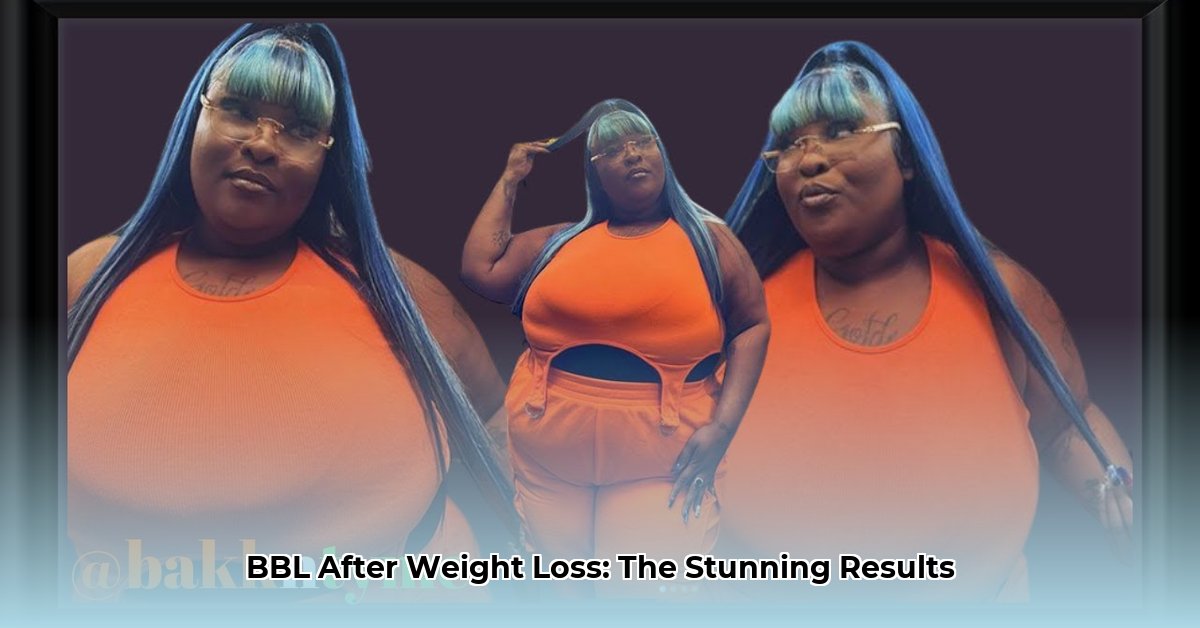
Thinking about a Brazilian Butt Lift (BBL) after weight loss? Understanding how weight fluctuations affect your results is crucial. This guide will clarify the science, provide a post-surgery plan, and offer expert advice to help you maintain your BBL's appearance.
Understanding Fat Cell Behavior: The Key to Long-Term Results
Your body's response to weight loss influences your BBL's longevity. Fat cells, whether naturally occurring or transferred during a BBL, shrink when you lose weight. The degree and speed of this shrinkage depend on individual factors, making gradual weight loss preferable to rapid weight loss after a BBL.
Timing is Everything: When to Begin Weight Loss
The optimal time to begin weight loss after a BBL is usually three to six months post-surgery. This allows the transferred fat cells to integrate fully, reducing the risk of significant shape changes. "The longer you wait, the better," suggests Dr. Anya Sharma, Board-Certified Plastic Surgeon at Advanced Aesthetics Institute. "This allows for optimal fat graft survival and integration, minimizing the impact of subsequent weight loss." Your surgeon will personalize this recommendation based on your individual circumstances and healing progress.
After Your BBL: A Strategic Approach to Weight Loss
Maintaining a stable weight is key to preserving your BBL results. Here's a strategic approach:
Consult Your Surgeon: Discuss your weight loss plan with your surgeon before and after your procedure. They can help you set realistic goals and a safe timeline.
Gradual Weight Loss: Aim for a slow, steady weight loss. Rapid weight loss increases the risk of volume reduction and asymmetry.
Healthy Lifestyle: Prioritize a balanced diet and regular exercise. These habits support your weight-loss goals and promote overall health.
Addressing Concerns: Asymmetry and Volume Reduction
Many patients worry about asymmetry or volume loss after weight loss. While these are valid concerns, they're often manageable. Dr. David Chen, a renowned plastic surgeon, explains, "While significant weight loss can impact BBL results, it doesn't always mean irreversible changes. A healthy lifestyle combined with potential revision surgery can address these issues."
The Impact of Weight Change on BBL Outcomes
The degree of impact on your BBL depends on the amount of weight lost:
| Weight Change | Likely Impact |
|---|---|
| Minor (10-15 lbs) | Minimal to unnoticeable changes. |
| Moderate (15-30 lbs) | Possible slight volume reduction; minimal asymmetry. |
| Significant (>30 lbs) | Noticeable volume reduction; increased risk of asymmetry. |
Important Note: These are estimates. Individual results vary based on factors like genetics, surgical technique, and individual body composition.
Maintaining BBL Results: A Comprehensive Plan
Key Takeaways:
- Weight stability is crucial for preserving BBL results.
- Gradual weight loss minimizes the risk of shape alterations.
- Adhering to your surgeon's postoperative instructions is vital.
- Open communication between you and your surgeon is essential.
- A healthy lifestyle is instrumental in long-term maintenance.
A Step-by-Step Guide to Long-Term BBL Success
Prioritize Weight Stability: Maintain a healthy weight before and after surgery. This is the single most significant factor impacting long-term results.
Follow Post-Operative Instructions: This includes proper wound care, compression garments, and activity restrictions.
Maintain a Healthy Lifestyle: Regular exercise and a balanced diet contribute to weight stability.
Regular Check-Ups: Monitor your progress with your surgeon to address early concerns.
Consider Revision Surgery: If substantial volume loss occurs, discuss revision options with your surgeon.
Potential Risks and Their Mitigation
While BBL is generally safe, some risks are associated with significant weight loss:
| Risk Factor | Likelihood | Impact | Mitigation |
|---|---|---|---|
| Significant Weight Loss | Highly Likely | High | Weight stabilization; healthy lifestyle |
| Poor Post-Op Care | Moderately Likely | Moderate | Strict adherence to surgeon's instructions |
| Infection | Unlikely | High | Sterile surgical techniques; post-operative antibiotics |
| Fat Necrosis | Unlikely | Moderate | Skilled surgical technique |
| Asymmetry | Moderately Likely | Moderate | Skilled surgical technique; potential revision surgery |
Remember, open communication with your surgeon is crucial throughout this process. They’re your best resource for personalized advice and support. Maintaining a healthy lifestyle is not just about preserving your BBL; it's about your overall well-being.